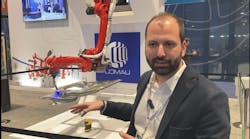Machine builders, integrators and end users can purchase industrial control hardware directly from a manufacturer, a distributor or an online store. Depending on who you talk to, each has its advantages.
When considering the options, there is not clear winner. In fact, a combined team effort including the manufacturer, distributor and integrator is often the best solution—a collaborated effort is optimal. Who's delivering the hardware (Figure 1)?
Direct from the manufacturer
From a machine builder’s perspective, manufacturers know their products. "The main advantage of buying direct from the manufacturer is the deep product knowledge," says Lyle Rusanowski, CEO at Delta Technology, a custom machine builder in Phoenix. "Going direct usually makes sense when you are buying an end product that will be integrated into a complete system."
Figure 1: Whether it's over the phone, online chat or in person, a human will eventually process your order.
Source: AutomationDirect
Manufacturers feel the same. "Manufacturers are the most knowledgeable on the ins and outs of the product, such as shortcuts, programming and troubleshooting tips," says Vikram Kumar, president at EZAutomation. "Direct support has its advantages since the manufacturer is typically the designer of the hardware, software and firmware of the product."
Although a manufacturer may have good product knowledge, they may struggle with application-specific questions. "Since the manufacturer is mainly concerned with the product, its focus tends to be deep, not broad," says Rusanowski. "Most do not have application engineers that are focused on going broad and applying the products in many applications. If the conversation becomes application-specific, a detailed review of the requirements and specifications is necessary to ensure the products can do it."
However, buying direct from the manufacturer is usually the most expensive choice since there is often no volume to leverage the sale against, cautions Rusanowski. The manufacturer has to cover all overhead through the sale of a small-volume buyer, so, unless your application calls for higher volume, you can usually find lower pricing with distributors.
But the results are mixed across the board. "I’ve had the opposite opinion in certain cases," says says Leon Krzmarzick, senior manager of control engineering at Delta Technology. "Festo’s applications guys have been very good, and they’ve been able to offer us very good discounts. But we’ve never purchased Festo through a distributor. SMC, on the other hand, used to be direct, and now we are getting better pricing through distributors."
AutomationDirect is the perfect example of an online distributor who is able to provide deep discounts because of the volume they deal in, continues Krzmarzick (Figure 2). "And then you have Allen-Bradley, who I noticed has relabeled other manufacturers’ products, and not being cheap, even with distributors," he says. "There’s a little of everything out there."
Figure 2: Online suppliers have large inventories.
Source: AutomationDirect
Sales, support and service by the manufacturer
Keyence is a manufacturer that sells directly throughout the world. Direct sales and same-day order processing has long been the backbone of Keyence’s underlying strength. It also has a large number of sales engineers employed throughout the world, enabling direct, on-site support and consultation to help with the specifying of the correct products.
"The direct sales channel will usually have better knowledge on the product," says David Shillaker, regional director at Keyence. "Information flow from product development through to technical support, training departments to sales engineers is usually better when controlled by a single organization."
When selling direct from the manufacturer, you can understand the market far better, says Shillaker. "This helps you make products that are most suited to customers’ needs," he says. "Understanding your product and customer allows you to explain the benefits more clearly."
From Keyence’s perspective, it is better to talk to the customer to fully understand what they want to do. The phone can help to do this, but it is often better to visit the customer so they can actually see the product and solution that is being proposed.
Factory direct via online store
"At c3controls, we have found, the more control we have over every step of the development process, manufacturing, fulfillment and service, the greater the benefit is to the machine builder, says Geoff Taylor, president and CEO at c3controls. "Our vertically integrated and factory-direct approach is innovative in its application to the electrical-controls marketplace where the vast majority of transactions are processed through legacy distribution channels or impersonal online warehouses."
Having greater control enables c3controls to manufacture rugged, durable and long-lasting products with a lifetime warranty, continues Taylor. "We are able to offer expert support because we design and manufacture the products; and we are able to offer pricing that provides tremendous value," he says. "This represents an electrical control product and supplier option that impacts the machine builder’s bottom line by improving cash flow and profitability—a business case that is unmatched in the industry."
Factory-direct is a customer-centric approach that systematically eliminates inefficiencies to deliver the best possible value, says Taylor. "To accomplish this, you can’t attempt to be all things to all people by offering more and more products," he says. "Attempting to do so without processes in place to ensure quality, availability, price and expert service will lead to diminishing outcomes for the customer."
Don't eliminate the middle-man
A factory-direct approach implies the customer is interacting directly with the manufacturer. "This does not necessarily exclude the distributor,” says Taylor. "A customer researching products is more likely to gain greater insight into the technology quicker by engaging the manufacturer of the product. They are best positioned to provide expert product and application support."
Distributors are able to service the machine builder in a variety of value-added ways as sourcing and procurement agents across a wide range of products and industries. "Challenges arise when distributor affiliations with specific manufacturers or suppliers exclude products from consideration that would benefit the machine builder, both in the application and the bottom line," says Taylor.
Customers often chose to work directly with c3controls, but, it has has a long history of partnerships with distributors to provide customers with expanded control product options. "We have numerous productive OEM, manufacturer and distributor relationships across the country and internationally that are predicated on customer preference," says Taylor. "No single manufacturer is able to supply and service all of the products used by the machine builder, system integrator or end user in their applications and operations."
One size doesn’t fit all
The needs of the machine builder, system integrator or end user are dynamic, spanning many products serviced by many manufacturers and industries. "Distributors have a role in servicing these needs,” says Taylor. "At c3controls, we believe that the manner in which these needs are served is evolving. The efficiencies enabled by the Internet and mobile devices have had a dramatic impact on every market. In many ways, business-to-business has lagged in adapting service models that take advantage of these changes in service to the customer.”
One thing is for certain, there is not a one-size-fits-all solution. “To succeed, manufacturers and distributors alike must adapt their models so they are capable of plugging into and adding value as a part of complex and immediate procurement and service needs of the machine builder, system integrator or end user," adds Taylor.
The Internet and mobility have empowered buyers. They expect to be able to find what they need—products and resources—immediately and without the need to call or even email someone. An online presence is no longer a marketing tool; it’s a portal expected to service the needs of the customer at every stage of the buying process. The number of companies purchasing online is growing rapidly, but it’s nowhere near the number of orders called or faxed by machine builders, system integrators or end users.
"At c3controls we have found that you must be capable, efficient and reliable in servicing the customer needs online, on the phone, or by fax,” explains Taylor. “Having a representative available to provide detailed and timely expert product and application support is a must-have. Accomplishing this is a differentiator as many manufacturers require customers to cobble together solutions themselves through a combination of online resources, distributor reps and support staff that often require numerous and time-consuming steps."
Distributor advantages
Distributors can help to deliver a wide variety and the correct product at a discounted price from a single company (Figure 3). "Distributors are interested in moving as much volume as they can," notes Rusanowski at Delta Technology. "This drives lower volume discounts and improves margins, so their focus shifts to applications."
If the buyer doesn’t need the deep process information, the company will usually go to distributors and discuss the application it wants to use the product in, continues Rusanowski.
"Distributors are able to leverage volume, so we usually get much better pricing, and, if we can consolidate purchasing of many products through the same distributor, we get further discounts," he says. "The distributor's account representative also usually tracks down and helps resolve any issues, should they come up."
Figure 3: Variety is the key to providing customers what they want from a single source.
Source: Allied Electronics
The distributors are very helpful in the product selection process. "A big advantage to using distributors is that they can get involved in, and be responsible for, proper product selection," says Krzmarzick. "For example, servo-motor sizing applications can become complex, but a good distributor will help to size all components in the application and then stand behind that solution."
Distributors connect with the customer
Some distributors have sales offices spread out across the United States, Canada and Mexico. "Allied Electronics is a distributor providing a unique portfolio that features premier brands of industrial automation and electronic products, most preferred by customers, all under one roof," says Dan Stewart, vice president of marketing at Allied Electronics. "With the combination of the product portfolio and support of local sales reps across the country, Allied acts as an extension of the customer’s business and is committed to the customer’s best interest."
In Allied’s case, it has 43 sales offices across the United States and Canada that are dedicated to helping customers. "These offices are backed up by a technical support team and field applications engineers that can help our customers solve the most complex problems," says Stewart. Allied also has the ability to get products to customers quickly.
"There are many advantages to using a distributor," says Stewart. "The best distributors will carry a large amount of inventory across a broad range of products, making it easy to source from a single vendor. This saves a lot of time and money for the customer as opposed to using different vendors for each type of product."
Allied customers want their problems solved quickly so they can get back to work, and Allied also works closely with its manufacturers. "Our manufacturers aren’t just suppliers to us; they are strategic partners that view distribution as a way to enhance their offers, says Stewart. “This is why most of our manufacturer partners encourage customers to buy through distribution."
Newark element14 is a global multi-channel distributor with a regional footprint. "We have feet on the street who are assigned to strategic customers, inside sales centers, e-commerce and customized e-procurement," says Michael Ulch, global head, electromechanical product management at Newark. "We also have a vibrant community site where engineers collaborate and share ideas. This model is replicated in all global regions, in many languages and currencies."
Newark lets customers dictate which channel is most appropriate for them, continues Ulch. "Our e-commerce channel continues to grow, and we encourage customers to be comfortable navigating all of the great resources that are available online," he says. "Our most loyal customers typically use all of the channels, depending on the particular circumstance."
Newark considers itself a high-service distributor, and high-service involves many things working seamlessly to put a box in the customer’s hands virtually anywhere in the world within a short period of time, says Ulch. "We love small orders from lots of customers with mission-critical demands," he says. "Manufacturers are not set up for the kind of order and demand variability that customers face every day, nor should they be. That’s why they love distributors, too."
Collaborative purchasing
"While there are exceptions where very specialized services are necessary directly from the manufacturer of the product, as a general rule, the highest value to the end user or OEM will be delivered through the utilization of an authorized distributor’s service in combination with a system integrator certified by the manufacturer," says Peter Treible, national industrial partner manager at Siemens. The distribution structure for the industrial market is primarily comprised of high-technology distributors that are committed to providing value-added services to OEMs, end users and system integrators, says Treible. "For Siemens, those value-added services include expert technical knowledge of our Totally Integrated Automation (TIA) products and services, including PLC, HMI, industrial communications, drives, motion control, control, MCC and motor product lines," he says.
To complement the day-to-day services that its authorized distributors provide to optimize plant-floor productivity and uptime, Siemens introduced its Siemens Solution Partner program a decade ago to address the needs of end users and OEMs on automation and drive projects. "The program offers a collaborative approach that enables end users and OEMs to leverage the benefits of working with a world-class industrial product manufacturer, a high-technology distributor that offers product and logistical services capability and specialized engineering services to address specific application requirements," says Treible.
The program offers advantages to the end users, the OEMs, the distributors and the qualified system integrators that are members of the Siemens Solution Partner program. "The key to the success of the program for end users and OEMs is that each project is evaluated to optimize the supply chain of products and services available from Siemens, the distributor and the solution partner," says Treible. "It is therefore recommended that end users and OEMs should support the sponsorship of a collaborative engagement of Siemens and a Siemens authorized distributor and a certified Siemens Solution Partner to maximize the value of the automation investments."
Online store advantages
Online stores appear to have the lowest pricing but with a lack of the personal touch. "Purchasing from online stores is typically the lowest pricing that you can get, but you don’t have the face-to-face support like the distributors," says Delta’s Rusanowski. "Since we are a custom integrator, we usually need more support than the online stores can provide. However, for commodity type products, online stores are very cost effective, and we use them quite a bit."
Rusanowski sees two primary differentiators when using online stores. The first is the user-friendliness of the website. “Some sites do not make it easy to buy multiple products or multiple items, so we generally will move away from them,” he says. The second is items in stock. “If sites have items in stock and we can get them quickly, we will buy from that site,” says Rusanowski.
"Another advantage of good online stores is that CAD models and technical specifications and manuals are readily available," says Krzmarzick. "It is very convenient to go to a website, select the product and then immediately have access to the CAD model for the configured or selected product. Websites with good selection, configuration tools and accurate CAD models will continue to get our business."
An online store leader
AutomationDirect sells in North America, South America, Europe, Australia and South Africa. Its primary sales in the United States and Canada are direct via Internet and catalog, with international distribution in other areas of the world.
Although a prejudice often exists regarding online stores’ technical support, AutomationDirect’s technical support staff is winning awards. "Our technical support staff is fully trained on our own products and has won awards 14 years in a row for our main programmable products—PLCs and HMIs," says Gary Marchuk, business development director at AutomationDirect. "Since our staff is supporting our own products, via phone or online, if the question gets too tough, our support staff has product engineers and developers at their disposal to provide answers in a quick and efficient manner as a backup (Figure 4)."
Figure 4: With online stores, good tech support is on the path to success.
Source: AutomationDirect
AutomationDirect tries to provide any and all information a customer might need to make a purchase, with all product specifications, manuals, certifications and prices available 24/7. "For most products we have product videos available that show a customer how a product is used or how it is programmed," says Marchuk. "We offer 2D and 3D drawings of most products up front for evaluation and also provide the manual for free in downloadable form. For most programmable products, we allow the user to download the programming software for free to evaluate on their own time. In this day of instant information, we believe this is what most purchasers want."
AutomationDirect finds that customers are considering online automation purchases with increased regularity, says Marchuk. "With higher Internet bandwidths and customer access to the Internet, they can get anything they want the instant they want it," he says. "There is little that most customers need that they cannot get from our Web store."
Delta Technology is cautious when using online stores because of the past experiences they’ve had. “There is often no support,” warns Rusanowski, “so you have to know what you’re getting. And, if there is a problem, you generally will have to resolve it yourself.”
Krzmarzick has similar concerns. "You risk not getting the optimal solution," he says. "A distributor or manufacturer will often ensure you are aware of the options available, including new releases, helping to ensure you have an optimal solution. Only some of the online stores have great technical support."
Online and distribution relationships
EZAutomation primarily sells factory direct, via an online store or over the phone, explains Kumar, its president. "However, with EZAutomation being a division of the larger AVG group of companies, it also offers distribution of EZAutomation products throughout the United States and globally. U.S. distributors are scattered throughout the country, each with its own sales territory, such as east coast, midwest, south and west coast."
EZAutomation distributors provide additional service in comparison to a typical distributor, says Kumar. "We are not just order takers, but rather value-added resellers," he explains. "We offer technical support, machine startup/debugging process and conversions from competitor products. It is an advantage to establish a local relationship over a period of time. With specific territorial distributors, we can cater to the customer's needs a little faster if they are just a short drive away."
Which is most popular?
It's unclear which channel is most popular. Delta Technology purchases from manufacturers, distributors and online stores, depending on the project and the need. However, the bulk of its purchasing of critical items is done through distributors. "Having the application support is like having extra engineers in-house to help you to solve problems," says Rusanowski. "When looking at costs, I can evaluate in terms of what value the distributor provides and compare that to the amount of time my team needs to spend to get the same information.”
Other than critical hardware, the most popular method of purchasing used by Delta is online, says Rusanowski. "The tools available from placing large orders to the tracking capabilities make this much easier to keep control of our supply chain,” he says. “Sales representatives and phone support are important when there are issues or when learning about line cards, but when you look at purchasing, I would estimate more than 90% is done via online orders."
There are several reasons why machine builders prefer ordering online. "My preference is to purchase online whenever possible, preferably direct from the manufacturer," says Marshall Miles, managing director at Global Controls in Saint Charles, Illinois. "I like the immediate access to the specifications, pricing and availability, and anonymous access is the best without the need to register to use the portal. Whenever I have to talk with someone, they typically have an agenda and want to find out more about the project, usually fishing for something else to sell."
As an engineer, Miles always has work to do, so time is very precious, he says. "Once I have a clear path for a solution mapped out, the best way through is to stay hyper-focused and get that solution implemented," he says. "Anything else is a distraction. Distributors and manufacturers are almost always biased, and perhaps they should be. However, in my experience technical reps and sales engineers often have little practical knowledge to offer to our complex applications."
Miles typically just emails a bill of material to distributors for price and delivery and then sends a purchase order. He also will purchase online as a second popular choice, but his last resort is to talk to a sales representative, unless the rep has established a close relationship and can provide the technical expertise he requires.
Drivers of the purchasing method
"We are a machine builder of the DuroVac brand of industrial vacuums," says Kevin Weaver, president at Northwind Air Systems in Mississauga, Ontario. "We specify the controls we need and buy complete solutions from panel builders. The choice of panel builder depends on the type of control panel we need."
For panels where 20 or more of the same thing is needed, Northwind buys directly from Eaton, a manufacturer that also has an OEM division. In this case, the control panels are engineered products built specifically for Northwind's machines of which multiples are sold.
Figure 5: Whether it’s one or many parts, someone will be there to deliver the goods.
Source: AutomationDirect
For Northwind's configurable, modular machines, it also purchases from Eaton through a manufacturer’s arrangement where it has a pre-engineered family of panels with options consisting of pre-engineered logic or control methods. The configurable panel can then be purchased by specifying predefined optional components.
For panels that are required outside of the configurable family, the custom panels or specials, Northwind purchases from a number of panel builders. That choice of builder depends on their familiarity with some of what Northwind does and on the price. The U.S.-Canada exchange rate does make a difference.
"Northwind doesn't build panels, since they need to be built to CSA, UL or CE standards," says Weaver. "We typically don't purchase components online or from manufacturers. We buy from panel builders, who from our point of view are the distributors, and we use their expertise."
Industrial Amazon Prime
Regardless of whether the purchasing source is a manufacturer, distributor or online store, supply chain management is most important. "In my opinion, supply chain management is the most critical factor in delivering a project on time," says Rusanowski. "We work closely with suppliers that can help us to manage the supply chain and reduce its variability. By managing these relationships and building partnerships where possible, it helps to lower the overall project risk and improves the ability to satisfy the end customer."
Global Controls’ Miles thinks Rockwell Automation’s ProposalWorks and Integrated Architecture Builder are handy tools and that AutomationDirect is a good website and purchasing choice (Figure 5).
Instead of picking a manufacturer, distributor or online store as the best choice, he would like to see advances in purchasing direct. "I would like to be able to anonymously post a BOM in a database file and receive qualified price and delivery quotes, kind of like the uship.com model,” says Miles. “An industrial Amazon Prime-type of way to buy everything from every manufacturer will be wonderful once that arrives."
[sidebar id=7]











